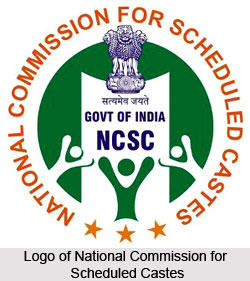 The National Commission for Scheduled Castes has been constituted under Article 338 of the Constitution of India as amended by the Constitution (Eighty-Ninth Amendment) Act, in the year 2003. The Commission shall consist of a Chairperson, a Vice-Chairperson and three other Members.
The National Commission for Scheduled Castes has been constituted under Article 338 of the Constitution of India as amended by the Constitution (Eighty-Ninth Amendment) Act, in the year 2003. The Commission shall consist of a Chairperson, a Vice-Chairperson and three other Members.
Article 338 of the Constitution provides for a National Commission for Scheduled Castes-
(1) There shall be a Commission for the Scheduled Castes to be known as the National Commission for the Scheduled Castes.
(2) Subject to the provisions of any law made in this behalf by Parliament, the Commission shall consist of a Chairperson, Vice- Chairperson and three other Members and the conditions of service and tenure of office of the Chairperson, Vice-Chairperson and other Members so appointed shall be such as the President may by rule determine.
(3) The Chairperson, Vice-Chairperson and other Members of the Commission shall be appointed by the President by warrant under his hand and seal.
(4) The Commission shall have the power to regulate its own procedure.
(5) It shall be the duty of the Commission-
(a) To investigate and monitor all matters relating to the safeguards provided for the Scheduled Castes under this Constitution or under any other law for the time being in force or under any order of the Government and to evaluate the working of such safeguards;
(b) To inquire into specific complaints with respect to the deprivation of rights and safeguards of the Scheduled Castes;
(c) To participate and advise on the planning process of socio- economic development of the Scheduled Castes and to evaluate the progress of their development under the Union and any State;
(d) To present to the President, annually and at such other times as the Commission may deem fit, reports upon the working of those safeguards; (e) to make in such reports recommendations as to the measures that should be taken by the Union or any State for the effective implementation of those safeguards and other measures for the protection, welfare and socio- economic development of the Scheduled Castes ; and (f) To discharge such other functions in relation to the protection, welfare and development and advancement of the Scheduled Castes as the President may, subject to the provisions of any law made by Parliament, by rule specify.
(6) The President shall cause all such reports to be laid before each House of Parliament along with a memorandum explaining the action taken or proposed to be taken on the recommendations relating to the Union and the reasons for the non-acceptance, if any, of any of such recommendations.
(7) Where any such report, or any part thereof, relates to any matter with which any State Government is concerned, a copy of such report shall be forwarded to the Governor of the State who shall cause it to be laid before the Legislature of the State along with a memorandum explaining the action taken or proposed to be taken on the recommendations relating to the State and the reasons for the non-acceptance, if any, of any of such recommendations.
The Commission shall, while investigating any matter referred to in sub-clause (a) or inquiring into any complaint referred to in sub-clause (b) of clause (5), have all the powers of a civil court trying a suit and in particular in respect of the following matters, namely:-
(a) Summoning and enforcing the attendance of any person from any part of India and examining him on oath;
(b) Requiring the discovery and production of any document;
(c) Receiving evidence on affidavits;
(d) Requisitioning any public record or copy thereof from any court or office;
(e) Issuing commissions for the examination of witnesses and documents;
(f) Any other matter which the President may, by rule, determine.
(9) The Union and every State Government shall consult the Commission on all major policy mattes affecting Scheduled Castes.
(10) In this article, references to the Scheduled Castes shall be construed as including references to such other backward classes as the President may, on receipt of the report of a Commission appointed under clause (1) of article 340, by order specify and also to the Anglo-Indian community.




















